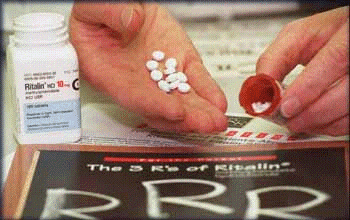But the early results of a large national study indicate that drug therapy for children with attention deficit and hyperactivity disorder (ADHD) is not only effective, but much better than psychological counseling alone.
At a recent child psychiatry conference, the researcher in charge of the study said he hopes the new findings encourage people to stop criticizing parents and teachers for what appears to be a genetic, biologically based disorder.
“There’s been a lot of blaming the victim,” said Peter Jensen, head of child and adolescent research at the National Institute of Mental Health. “But looking at these results, we can’t say better parenting is the answer for most of these kids.”
Study Sneak Preview
ADHD affects 3 percent to 5 percent of all school-age children, usually showing up as restlessness, an inability to concentrate, being easily distracted, trouble following directions, constant fidgeting or excessive talking. It accounts for one-third to one-half of referrals for children’s mental health services.
Jensen’s study, the largest of its kind, aims to answer the controversial question of how best to treat those kids. Roughly 600 7- to 9-year-olds, at six different sites around the country, were randomly placed in one of four groups: medication (mostly Ritalin, but also other drugs); psychosocial (parent training and social-skill building); combination medication and psychosocial; and referral back to the community doctor.
The final results have not yet been published in a scientific journal, but Jensen and his colleagues discussed early findings last week at the American Academy of Child and Adolescent Psychiatry meeting in Anaheim, Calif.
After 14 months of treatment, 12 percent to 15 percent of children on medication or a combination of therapy and medication still had behavior problems. That figure increased to 32 percent to 35 percent among children who got only psychosocial or community-based treatment.
For certain children, such as those with anxiety disorders, combination therapy worked best.
Cure or Substitute Disorder?
Dr. Peter Breggin, author of “Talking Back to Ritalin” and the drug’s most outspoken critic, calls the findings “outrageous” and says that just because the drug is effective doesn’t mean it’s safe.
“There’s no way around the fact that these drugs work by causing changes in the child’s brain,” he says. “They actually create obsessive-compulsive effects, which are then mistaken for improved study habits. They cut back on children’s spontaneity, their curiosity, their sense of exploration. Their vitality is suppressed.”
Breggin argues that doctors and parents have turned to “conformity” drugs as a solution to inadequate discipline, overcrowded classrooms, boredom and resistance to authority.
But ADHD expert Russell Barkley, professor of psychiatry and neurology at the University of Massachusetts Medical Center, says attention deficit disorder is more than just a little rebelliousness. Kids with ADHD score seven to 10 points lower on intelligence tests, are more likely to be held back a grade or not graduate, and face a much higher risk of later trouble, such as stealing or substance abuse.
The NIMH study, Barkley says, should ease parents’ concerns about using drugs like Ritalin as a first-choice treatment for their children, rather than a last resort, especially since other studies have shown that the drug’s side effects are usually not serious or long-lasting.
“This is literally the best study of its kind ever done on this issue, and it vindicates the use of medications in treating this disorder,” he adds. “It certainly doesn’t mean that medications should be used alone and everything else thrown out, but medication is the most effective.”
Jensen’s findings and other studies will be on the table later this month, when the National Institutes of Health will host a meeting of ADHD experts to review and discuss the latest research on diagnosing and treating the disorder. The group will put together a consensus statement on the best treatments for ADHD, as well as the risks of stimulant drugs.
The Associated Press contributed to this report.

